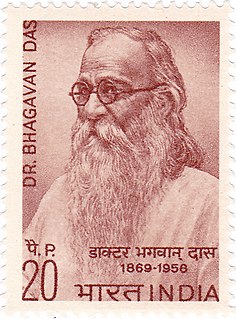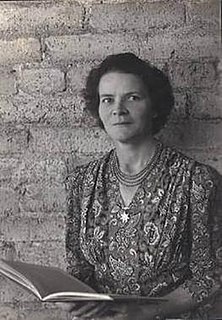
The Theosophical Society, founded in 1875, is a worldwide body with aim to advance the ideas of Theosophy in continuation of previous Theosophists, especially that of the Greek and Alexandrian Neo-Platonic philosophers dating back to 3rd century AD. It also encompasses wider religious philosophies like Vedānta, Mahāyāna Buddhism, Qabbalah, and Sufism. The Theosophical Society functions as a bridge between East and West, emphasizing the commonality of human culture.

Bhagwan Das was an Indian Theosophist and public figure. For a time he served in the Central Legislative Assembly of British India. He became allied with the Hindustani Culture Society and was active in opposing rioting as a form of protest. As an advocate for national freedom from the British rule, he was often in danger of reprisals from the Colonial government. He was awarded the Bharat Ratna in 1955.
Avidyā is a Sanskrit word whose literal meaning is ignorance, misconceptions, misunderstandings, incorrect knowledge, and it is the opposite of Vidya. It is used extensively in Hindu texts, including the Upanishads, and in other Indian religions such as Buddhism and Jainism, particularly in the context of metaphysical reality.
The Theosophical Glossary by Helena Blavatsky was first published in 1892. Some other important theosophical glossaries are the Encyclopedic Theosophical Glossary by Gottfried de Purucker and the Collation of Theosophical Glossaries.

Isis Unveiled: A Master-Key to the Mysteries of Ancient and Modern Science and Theology, published in 1877, is a book of esoteric philosophy and Helena Petrovna Blavatsky's first major work and a key text in her Theosophical movement.
Brahmavidya (derived from the Sanskrit words brahma and vidyā) is that branch of scriptural knowledge derived primarily through a study of the divine. Brahmvidya is the knowledge and spiritual knowledge of divine faith/God/existence. Put together, it means knowledge of the mantra/absolute. Brahmavidya is considered to be the highest ideal of classical. Brahmvidya does not pertain to hinduism, many other faiths practice and learn brahmvidya through different means, the Sikhs practice and learn brahmvidya through their Guru, the eternal Guru of the Sikhs, Guru Granth Sahib Ji. Each faith teaches about the divine through different studies, yet the brahmvidya is one and the same - Truth itself.

The Theosophical Society Point Loma was based at the Theosophical community of Lomaland in the Point Loma district of San Diego, California from 1900 to 1942, and the international headquarters of a branch of the Theosophical Society from 1900 to 1942. It moved to Covina in Los Angeles County in 1942 and was the branch's international headquarters to 1945, when it moved to Pasadena, California and became the Theosophical Society Pasadena, the branch's current international headquarters.

Theosophical teachings have borrowed some concepts and terms from Buddhism. Some theosophists like Helena Blavatsky, Helena Roerich and Henry Steel Olcott also became Buddhists. Henry Steel Olcott helped shape the design of the Buddhist flag. Tibetan Buddhism was popularised in the West at first mainly by Theosophists including Evans-Wentz and Alexandra David-Neel.
Avidyā in Buddhist literature is commonly translated as "ignorance". The concept refers to ignorance or misconceptions about the nature of metaphysical reality, in particular about the impermanence and non-self doctrines about reality. It is the root cause of Dukkha, and asserted as the first link, in Buddhist phenomenology, of a process that leads to repeated birth.
Sri Viswa Viznana Vidya Adhyatmika Peetham is a theosophical congregation which states that it is based on the principles of oneness of God, and discovering divinity in the self. The ashram is situated in Pithapuram, East Godavari district, Andhra Pradesh, India.
Aparoksha, a Sanskrit adjective meaning not invisible or perceptible, refers to direct intuitive knowledge which is one of the seven stages of knowledge or conditions of Chidabhasa, the first three being the sources of bondage and the rest four being the processes of liberation; and to the continuation of the deepening of conventional knowledge. It removes sorrows. According to Indian philosophy, the three traditional kinds of knowledge are – pratyaksha (empirical), paroksha and aparoksha (transcendental). Aparoksha is the highest kind of knowledge which cannot be gained without the practice of morality that converts paroksha knowledge from which unity of existence is derived. This knowledge is gained by establishing a guru-shishya sambandha with a teacher who has already experienced that kind of knowledge (Aparoksanubhuti); the karma or acts required to be done, after gain of Aparoksha jnana is Vidya-karma which consists in sravana, manana (reflection) and nididhyasana.
Vidya figures prominently in all texts pertaining to Indian philosophy – to mean science, learning, knowledge and scholarship; most importantly, it refers to valid knowledge which cannot be contradicted and true knowledge which is the knowledge of the self intuitively gained. Vidya is not mere intellectual knowledge, for the Vedas demand understanding.

Judith Tyberg (1902–1980) was an American yogi ("Jyotipriya") and a renowned Sanskrit scholar and orientalist. Author of The Language of the Gods and two other reputed texts on Sanskrit, she was the founder and guiding spirit of the East-West Cultural Center in Los Angeles, California, a major pioneering door through which now-celebrated Indian yogis and spiritual teachers of many Eastern and mystical traditions were first introduced to America and the West.

Within the system of Theosophy, developed by occultist Helena Blavatsky and others since the second half of the 19th century, Theosophical mysticism draws upon various existing disciplines and mystical models, including Neo-platonism, Gnosticism, Western esotericism, Freemasonry, Hinduism and Buddhism.
Parā Vidyā is a combination of two words – parā, in Hindu philosophy, means - existence, paramount object, the highest point or degree, final beatitude; and vidyā means - knowledge, philosophy, science, learning, scholarship. Para Vidya means – higher learning or learning related to the Self or the Ultimate Truth i.e. transcendental knowledge. Vedanta affirms that those who gain the knowledge of the Self attain kaivalya, they become liberated, they become Brahman.

"Is Theosophy a Religion?" is an editorial published in November 1888 in the theosophical magazine Lucifer; it was compiled by Helena Blavatsky. It was included in the 10th volume of the author's Collected Writings. According to Arnold Kalnitsky, in the article it is about the problems of religion from the Theosophical point of view.

Esoteric Buddhism is a book originally published in 1883 in London; it was compiled by a member of the Theosophical Society, A. P. Sinnett. It was one of the first books written for the purpose of explaining theosophy to the general public, and was "made up of the author's correspondence with an Indian mystic." This is the most significant theosophical work of the author. According to Goodrick-Clarke, it "disseminated the basic teachings of Theosophy in its new Asian cast."

Modern Theosophy is classified by prominent representatives of Western philosophy as a "pantheistic philosophical-religious system." Russian philosopher Vladimir Trefilov claimed that Blavatsky's doctrine was formed from the beginning as a synthesis of philosophical views and religious forms of the various ages and peoples with modern scientific ideas. Michael Wakoff, an author of The Routledge Encyclopedia of Philosophy, stated that Blavatskian Theosophy was based on Buddhist and Hindu philosophy, and fragments of the Western esotericism with using an "absolutist metaphysics." In The New Encyclopedia of Philosophy it is said that Blavatsky's Theosophy is an attempt to merge into a universal doctrine all religions by revealing their "common deep essence" and detection of "identity meanings of symbols," all philosophies, and all sciences.

"What Is Theosophy?" is an editorial published in October 1879 in the Theosophical magazine The Theosophist. It was compiled by Helena Blavatsky and included into the 2nd volume of the Blavatsky Collected Writings. According to a doctoral thesis by Tim Rudbøg, in this "important" article Blavatsky "began conceptualizing her idea of 'Theosophy'."

Hinduism is regarded by modern Theosophy as one of the main sources of "esoteric wisdom" of the East. The Theosophical Society was created in a hope that Asian philosophical-religious ideas "could be integrated into a grand religious synthesis." Prof. Antoine Faivre wrote that "by its content and its inspiration" the Theosophical Society is greatly dependent on Eastern traditions, "especially Hindu; in this, it well reflects the cultural climate in which it was born." A Russian Indologist Alexander Senkevich noted that the concept of Helena Blavatsky's Theosophy was based on Hinduism. According to Encyclopedia of Hinduism, "Theosophy is basically a Western esoteric teaching, but it resonated with Hinduism at a variety of points."








